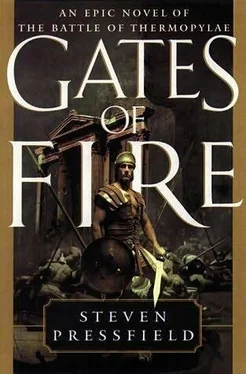Steven Pressfield - Gates of Fire - An Epic Novel of the Battle of Thermopylae
Здесь есть возможность читать онлайн «Steven Pressfield - Gates of Fire - An Epic Novel of the Battle of Thermopylae» весь текст электронной книги совершенно бесплатно (целиком полную версию без сокращений). В некоторых случаях можно слушать аудио, скачать через торрент в формате fb2 и присутствует краткое содержание. Жанр: Историческая проза, на английском языке. Описание произведения, (предисловие) а так же отзывы посетителей доступны на портале библиотеки ЛибКат.
- Название:Gates of Fire: An Epic Novel of the Battle of Thermopylae
- Автор:
- Жанр:
- Год:неизвестен
- ISBN:нет данных
- Рейтинг книги:3 / 5. Голосов: 1
-
Избранное:Добавить в избранное
- Отзывы:
-
Ваша оценка:
- 60
- 1
- 2
- 3
- 4
- 5
Gates of Fire: An Epic Novel of the Battle of Thermopylae: краткое содержание, описание и аннотация
Предлагаем к чтению аннотацию, описание, краткое содержание или предисловие (зависит от того, что написал сам автор книги «Gates of Fire: An Epic Novel of the Battle of Thermopylae»). Если вы не нашли необходимую информацию о книге — напишите в комментариях, мы постараемся отыскать её.
Gates of Fire: An Epic Novel of the Battle of Thermopylae — читать онлайн бесплатно полную книгу (весь текст) целиком
Ниже представлен текст книги, разбитый по страницам. Система сохранения места последней прочитанной страницы, позволяет с удобством читать онлайн бесплатно книгу «Gates of Fire: An Epic Novel of the Battle of Thermopylae», без необходимости каждый раз заново искать на чём Вы остановились. Поставьте закладку, и сможете в любой момент перейти на страницу, на которой закончили чтение.
Интервал:
Закладка:
Mercifully the torrent lessened a few hundred yards down. The party rolled its cloaks into bundles and floated them on shields turned bowls-up. Dams had been erected by the enemy to abate the torrent and facilitate the watering of horses and men. Pickets had been stationed atop these, but the fog and wind made conditions so inhospitable, the hour was so late and the sentries so complacent, deeming infiltration unthinkable, that the party was able to steal past, bellying over the spillways, then coasting swiftly into the shadows along the bank.
The moon had set. Rooster could not pick out His Majesty's pavilion. It was here, I swear it!
He pointed across to a rise of land, upon which stood nothing but a street of grooms' tents snapping in the wind and a rope picket line shoulder-to-shoulder with horses standing miserably in the gale. They must have moved it.
Dienekes himself drew his blade. He was going to open Rooster's throat on the spot as a traitor.
Rooster swore by every god he could think of; he wasn't lying. Things look different in the dark, he offered lamely.
Polynikes saved him. I believe him, Dienekes. He's so fucking stupid, this is just the way he would screw it up.
The party slithered on, neck-deep in marrow-numbing rapids. At one point Dienekes' leg became snarled in a tangle of reeds; he had to submerge with his xiphos to cut himself free. He came up snorting.
I asked what he was laughing at.
I was just wondering if it was possible to get any more miserable. He chuckled darkly. I suppose if a river snake crawled up my ass and gave birth to quintuplets…
Suddenly Rooster's hand nudged my master's shoulder. A hundred paces ahead stood another dam and spillway. Three linen pavilions abutted a pleasant beach; a lantern-lit walkway snaked up the slope, past a hide corral in which were confined a dozen blanket-draped war mounts of such magnificence that the worth of each alone must have equaled the produce of a small city.
Directly above rose a copse of oak, lit by iron cressets howling in the gale, and beyond, past a single picket line of Egyptian marines, could be glimpsed the pennanted kingposts of a pavilion so vast it looked like it housed a battalion.
That's it. Rooster pointed. That's Xerxes' tent.
Chapter Thirty One
The warrior's thoughts at the brink of action, my master had often observed (as the student of fear he ever declared himself to be), follow a pattern unvarying and ineluctable. There appears always an interval, often brief as a heartbeat, wherein the inward eye summons the following tripartite vision, often in the selfsame order:
First to the inmost heart appear the faces of those he loves who do not share his immediate peril: his wife and mother, his children, particularly if they are female, particularly if they are young.
These who will remain beneath the sun and preserve within their hearts the memory of his passage, the warrior greets with fondness and compassion. To them he bequeaths his love and to them bids farewell.
Next arise before the inward eye the shades of those already across the river, they who stand awaiting upon the distant shore of death. For my master these comprised his brother, Iatrokles, his father and mother and Arete's brother, Idotychides. These, too, the warrior's heart greets in silent vision, summons their aid and then releases.
Lastly advance the gods, whichever a man feels have favored him most, whichever he feels himself most to have favored. Into their care he releases his spirit, if he can.
Only when this triple obligation has been requited does the warrior revert to the present and turn, as if arising from a dream, to those at his shoulder, they who in a moment will undergo with him the trial of death. Here, Dienekes often observed, is where the Spartans most hold advantage over all who face them in battle. Beneath what alien banner could one discover at his shoulder such men as Leonidas, Alpheus, Maron, or here in this dirt Doreion, Polynikes and my mas-ter, Dienekes, himself? These who will share the ferry with him, the warrior's heart embraces with a love surpassing all others granted by the gods to humankind, save only that of a mother for her babe. To them he commits all, as they all to him.
My own eyes now glanced to Dienekes, crouched upon the riverbank helmetless in his scarlet cloak which showed dead black in the darkness. His right hand was kneading the joints of his immobile ankle seeking to restore flexion, as he in compact phrase issued the instructions which would drive the men he commanded into action. At his shoulder Alexandras had scraped a fistful of sand from the bank and was scoring it along the haft of his eight-footer, abrading the surface for a grip. Polynikes with a curse worked his forearm into the sodden bronze and leather sleeve of his shield, seeking the point of balance and proper hold upon the gripcord. Hound and Lachides, Ball Player, Rooster and Doreion likewise completed their preparations. I glanced to Suicide. He was sorting swiftly through his darning needles, like a surgeon selecting his instalment, picking those three, one for his throwing hand, two for his free, whose heft and balance promised the truest flight. I moved in a crouch beside the Scythian, with whom I was paired in the assault. See you in the ferry, he said, and tugged me with him toward the flank from which we would attack.
Would his be the last face I would see? This Scythian, mentor and instructor to me since I was fourteen. He had taught me cover and interval, dress and shadow; how to stanch a puncture wound, set a broken collarbone; how to take down a horse upon the open field, drag a wounded warrior from battle using his cloak. This man with his skill and fearlessness could have hired himself out as a mercenary to any army in the world. To the Persians if he wished. He would have been appointed captain-of-a-hundred, achieved fame and glory, women and wealth. Yet he chose to remain in the harsh academy of Lakedaemon, in service for no pay. I thought of the merchant Elephantinos. Of all in camp, Suicide had taken most to this gay, ebullient fellow; the pair had become fast friends. On the evening before the first battle, when my master's platoon had settled, preparing the evening meal, this Elephantinos had appeared upon his rounds. He had traded away all his wares, bartered his waggon and ass, sold even his own cloak and shoes. Now on this night he circulated with a basket of pears and sweetmeats, distributing these treats to the warriors as they sat to their suppers. He stopped beside our fire. My master often sacrificed in the evenings; nothing much, just a crust of barley loaf and a libation, not praying aloud, just offering within his heart a few silent words to the gods. He would never reveal the contents of his prayer, but I could read it upon his lips and overhear the odd mumble. He was praying for Arete and his daughters.
It is these young boys who should practice such piety, the merchant observed, not you grisly veterans!
Dienekes greeted the emporos warmly. You mean 'grizzled,' my friend.
I mean grisly, week up to thees!
He was invited to sit. Bias was still alive then; he joked with the merchant about his want of forethought. How will the old-timer get away now, without his ass and waggon?
Elephantinos made no reply.
Our friend will not be leaving, Dienekes spoke softly, his gaze upon the earth.
Alexandras and Ariston arrived with a hare they had traded for with some boys from Alpenoi village. The old man smiled at the comradely ragging they endured from their mates over this prize. It was a winter hare, so scrawny it wouldn't flavor a stew for two men, let alone sixteen.
The merchant regarded my master.
To see you veterans with gray in your beards, it is only right that you should stand here at the Gates. But these boys. His gesture indicated Alexandros and Ariston, including in its sweep myself and several other squires barely out of their teens. How may I leave, when these babes remain?
Читать дальшеИнтервал:
Закладка:
Похожие книги на «Gates of Fire: An Epic Novel of the Battle of Thermopylae»
Представляем Вашему вниманию похожие книги на «Gates of Fire: An Epic Novel of the Battle of Thermopylae» списком для выбора. Мы отобрали схожую по названию и смыслу литературу в надежде предоставить читателям больше вариантов отыскать новые, интересные, ещё непрочитанные произведения.
Обсуждение, отзывы о книге «Gates of Fire: An Epic Novel of the Battle of Thermopylae» и просто собственные мнения читателей. Оставьте ваши комментарии, напишите, что Вы думаете о произведении, его смысле или главных героях. Укажите что конкретно понравилось, а что нет, и почему Вы так считаете.












